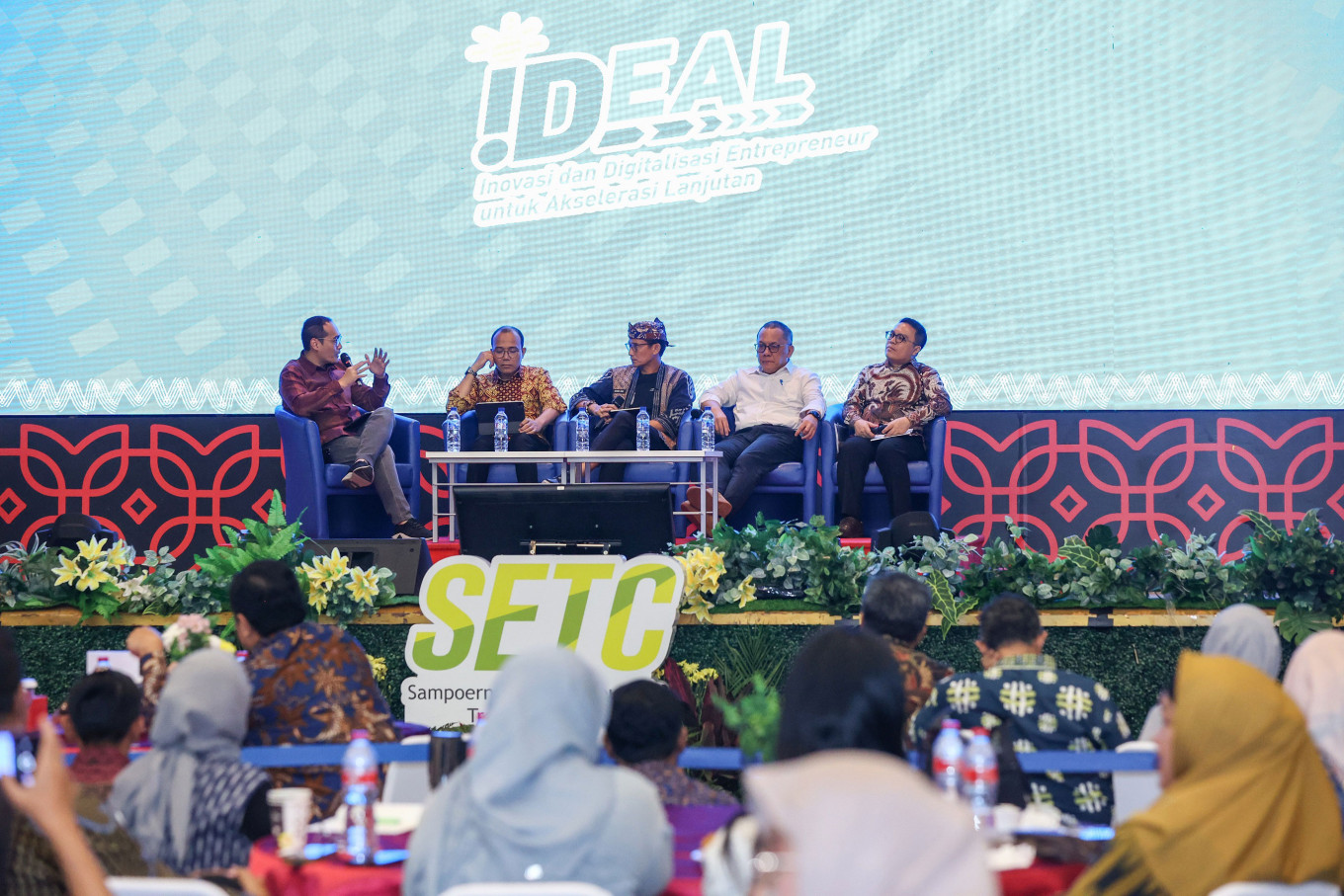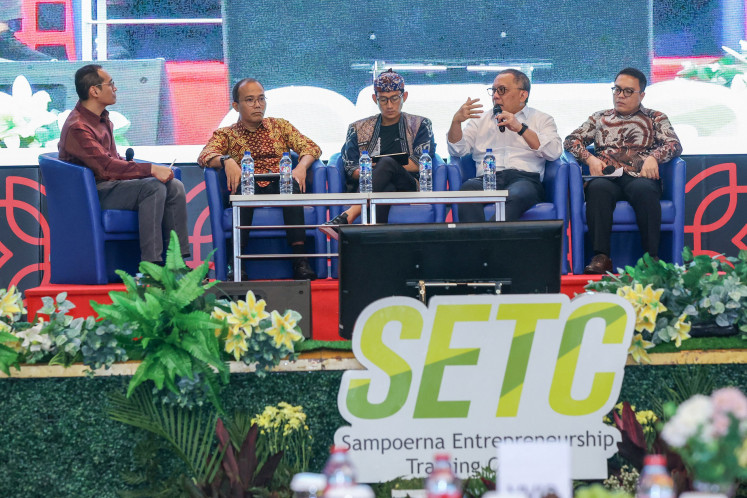Popular Reads
Top Results
Can't find what you're looking for?
View all search resultsPopular Reads
Top Results
Can't find what you're looking for?
View all search resultsSandiaga Uno applauds INOTEK-BRIN- Sampoerna collab, urges MSMEs to go digital
Change text size
Gift Premium Articles
to Anyone
M
inister of Tourism and Creative Economy Sandiaga S. Uno has urged micro, small and medium enterprises (MSMEs) to take advantage of the opportunities presented by the digital economy, which is estimated to reach US$110 billion by 2025, while assuring MSMEs that the government was working continuously to ensure their protection and fair competition so their businesses could grow.
In line with this, Sandiaga praised the consistent support provided by the MSMEs for Indonesia (UUI) program, a collaboration between the Indonesian Technology Innovation (INOTEK) Foundation and the National Research and Innovation Agency (BRIN) that had the full support of the Sampoerna Entrepreneurship Training Center (SETC) through the umbrella of its Sampoerna for Indonesia (SUI) sustainability program.
“I appreciate the program initiated by the Sampoerna Entrepreneurship Training Center. IDEAL is a program for the digitalization and innovation of MSMEs, helping them become entrepreneurs whose economies accelerate toward sustainable development,” the minister said on Oct. 10 at the Innovation and Digitalization Entrepreneur for Advanced Acceleration (IDEAL) 2024 in Jakarta.
The IDEAL event is the culmination of this year’s UUI program, which has supported 1,000 MSMEs from DKI Jakarta and West Java provinces since it commenced in February.
The UUI program and IDEAL event marked their second iteration this year, following their inaugural edition in 2023.
IDEAL 2024 selected five MSMEs as this year’s winners to receive further assistance from INOTEK, BRIN and the SETC: Batik Gending Amarta, Bogor Sari Nutrisi (Yess Yoghurt), Imah Teuweul Indonesia, Non-Pasteurized Honey and Mbrebes Mili Food.
Sandiaga expressed his hope that the mentoring provided by both public and private institutions would help MSMEs advance to the next level. He also said he hoped more of the 64 million MSMEs now operating in the country would be able to seize business opportunities and create jobs by leveraging the innovation and research provided by BRIN.
"The government will continue to strengthen and protect MSMEs to ensure fair competition. We are also facilitating MSMEs to enter the digital economy, which is expected to have opportunities worth US$110 billion by 2025, and MSMEs should be a priority," Sandiaga said.
Challenges for MSMEs
The minister noted that funding was not the main challenge facing MSMEs but capacity building, in particular human resource development.
Sandiaga emphasized that, based on his experience as an entrepreneur and his involvement in various business organizations, human resource training and development were vital to building capacity. MSMEs must be capable of producing high-quality, sustainable products, which was only possible if they had resilient human resources.
"Once they have the knowledge and can access opportunities, funding will come naturally. I always say the first challenge is building capacity. The second is marketing, which should be driven through promotion. After producing a certain capacity, then comes funding," he explained.
BRIN head Laksana Tri Handoko, who was also a panelist at IDEAL 2024, concurred that with capable human resources, MSME entrepreneurs could adapt and innovate to meet consumers’ changing needs.
"Innovation is related to adaptability, while research is closely tied to MSMEs. Don't think of research as academic. MSMEs access research from others and that is what the BRIN offers, a platform for innovation," said Laksana.
He added that the BRIN was open to receiving input from MSME entrepreneurs about the challenges they faced, and that the agency could provide immediate assistance in finding alternative solutions.
The BRIN was therefore highly enthusiastic about collaborating with INOTEK and the SETC to support MSME growth. Entrepreneurs could rely on BRIN researchers for solutions relevant to the problems they encountered in the field.
"Usually, MSMEs survive because they find new innovations that are different from what is available in the market," Laksana explained.
Herfan Brilianto Mursabdo, Assistant Deputy Coordinating Minister for Economic Affairs, who oversees cooperatives and MSMEs, said human resource capacity was the most important aspect for MSMEs, while technology was merely a tool. As such, training programs to increase digital literacy was essential alongside improved access to digital infrastructure.
"Many MSMEs in rural areas complain about slow internet speeds and high data costs. So, there are two things we need to address: improving infrastructure and enhancing human resource capacity," he said.
Riza Damanik, special staffer to the Minister of Cooperatives and SMEs for people’s economic empowerment, said the COVID-19 pandemic was a turning point for MSMEs in embracing digital technology.
Before the pandemic, fewer than 9 million MSMEs had gone digital. Today, more than 25 million MSMEs had adopted digital platforms, said Riza. It was hoped that the target of 30 million MSMEs going digital would be achieved by the end of this year.
"The challenge on the ground is a lack of digital literacy. But our MSMEs are quick learners, and that’s why the number of digital MSMEs continues to increase," he said.
Riza also pointed out that digitalization should not be narrowly defined as MSME products marketed on e-commerce platforms, as digitalization had a broader meaning that included increasing productivity.
Citing the latest BRIN research, he said 84 percent of MSME respondents found that digital adoption had boosted sales, 62 percent said it had expanded market reach, 73 percent found it had improved efficiency and 50 percent said it enhanced productivity.
"So, this is a comprehensive approach where we need to broaden our understanding of digitalization, not just focus on e-commerce, but also strengthen the production side," he underlined.











